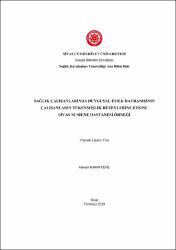| dc.contributor.advisor | Karagöz, Naim | |
| dc.contributor.author | Karatepe, Hakan | |
| dc.date.accessioned | 2020-01-28T13:06:39Z | |
| dc.date.available | 2020-01-28T13:06:39Z | |
| dc.date.issued | 2019 | tr |
| dc.date.submitted | 2019-06-17 | |
| dc.identifier.other | XVI, 108 sayfa | |
| dc.identifier.uri | https://hdl.handle.net/20.500.12418/12179 | |
| dc.description.abstract | Bu araştırmanın amacı sağlık çalışanlarının duygusal emek düzeyleri ile
tükenmişlik algılarını ölçmek, duygusal emeğin tükenmişliğe etkisini araştırmak ve
çalışanların duygusal emek düzeyleri ile tükenmişlik algılarının demografik
değişkenlere göre değişip değişmediğini saptamaktır. Araştırmada nicel araştırma
yöntemi ve ilişkisel tarama deseni kullanılmıştır. Araştırmanın evrenini Sivas
Numune Hastanesi’nde görev yapan 2051 sağlık çalışanı oluşturmaktadır. Çalışmaya
katılmak için gönüllü olan 356 çalışandan veri toplanmıştır. Veri toplama aracı
olarak iki ölçek ve bir de kişisel bilgi formu kullanılmıştır. Ölçekler; duygusal emek
ölçeği ile tükenmişlik ölçeğidir. Verilerin analizinde ortalama ve standart sapma gibi
tanımlayıcı istatistikler ile t test, anova, korelasyon ve regresyon analizlerinden
faydalanılmıştır. Araştırmanın önemli bulgularından bazıları şunlardır: Sağlık
çalışanlarının duygusal emek düzeyleri cinsiyet, iş yerindeki pozisyon ve kıdem
değişkenlerine göre anlamlı biçimde farklılaşmaktadır. Öte yandan medeni durum,
yaş, öğrenim durumu, çalışılan birim ve çalışma şekli değişkenleri sağlık
çalışanlarının duygusal emek düzeylerini anlamlı derecede farklılaştırmamaktadır.
Sağlık çalışanlarının tükenmişlik algısı yaş, mesleki kıdem ve çalışma şekilleri
değişkenlerine göre anlamlı ölçüde farklılaşmaktadır. Cinsiyet, medeni durum,
öğrenim durumu, hastanedeki görev ve çalışılan birim değişkenleri ise tükenmişlik
algısında farklılık oluşturmamaktadır. Duygusal emeğin alt boyutlarından yüzeysel
davranışın tükenmişliğin tüm alt boyutları ile anlamlı ilişkisi olduğu bulunurken
derin davranışın tükenmişliğin alt boyutları ile anlamlı bir ilişkisi olmadığı
görülmüştür. Doğal duyguların ise kişisel başarı ve duyarsızlaşma boyutları ile
anlamlı bir ilişkisi vardır. Son olarak duygusal emeğin hem alt boyutları hem de
geneli itibariyle tükenmişlik alt boyutları ve genel tükenmişlik üzerinde anlamlı bir
etkiye sahip olduğu saptanmıştır. | tr |
| dc.description.abstract | The aim of this study is to measure the emotional labor levels and burnout
perceptions of health employees, to investigate the effect of emotional labor on
burnout, and to determine whether emotional labor levels and burnout perceptions of
employees vary according to demographic variables. In this study quantitative
research method and relational survey design were adopted. The population of the
study consists of 2051 health employees working in Sivas Numune Hospital. Data
were collected from 356 employees who volunteered to participate in the study. Two
scales and a personal information form were used as data collection tools. Scales are
emotional labor scale and burnout scale. In the analyzing of the data section
descriptive statistics, t test, anova, correlation and regression analysis were used.
Some of the important findings of the research are as follows: Emotional labor levels
of health employees differ significantly according to gender, position in the hospital
and seniority. On the other hand, marital status, age, education level, unit of work
and mode of work do not significantly differentiate the emotional labor levels of
health employees. The perception of burnout of health employees varies significantly
according to age, seniority and mode of work. Gender, marital status, education
level, position in the hospital and unit of work variables do not differentiate the
perception of burnout. While surface acting which is a sub-dimension of emotional
labor was found to have a significant relationship with all sub-dimensions of burnout,
deep acting which is another sub-dimension of emotional labor did not have a
significant relationship with the sub-dimensions of burnout. True feelings have a
significant relationship with personal accomplishment and depersonalization
dimensions. Finally, it has been found that both sub-dimensions of emotional labor
and overall emotional labor degree have a significant effect on both sub-dimensions
of burnout and overall burnout degree. | tr |
| dc.language.iso | tur | tr |
| dc.publisher | Sivas Cumhuriyet Üniversitesi Sosyal Bilimler Enstitüsü | tr |
| dc.rights | info:eu-repo/semantics/openAccess | tr |
| dc.subject | Duygusal Emek | tr |
| dc.subject | Tükenmişlik | tr |
| dc.subject | Sağlık Çalışanları | tr |
| dc.title | Sağlık Çalışanlarında Duygusal Emek Davranışının Çalışanların Tükenmişlik Düzeylerine Etkisi: Sivas Numune Hastanesi Örneği | tr |
| dc.type | masterThesis | tr |
| dc.contributor.department | Sosyal Bilimler Enstitüsü | tr |
| dc.relation.publicationcategory | Tez | tr |















